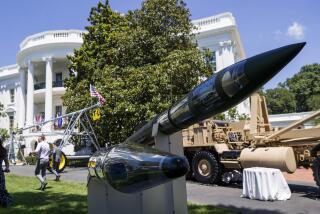Boeing Wins 3-Year, $1.6-Billion Defense Contract
WASHINGTON — The Pentagon on Thursday picked Boeing Co. over a team led by Lockheed Martin Corp. to develop a system to shield the United States from a “limited” ballistic-missile attack, a program potentially worth more than $5 billion over the next few years.
Boeing’s victory over Bethesda, Md.-based Lockheed Martin and partners Raytheon Co. and TRW came as the Defense Department awarded the first phase of the project to the Seattle-based aerospace concern under a three-year, $1.6-billion contract.
Boeing’s selection, which surprised some analysts who believed the Lockheed Martin group had the edge, also means another economic boost to Southern California’s shrunken aerospace industry.
By year’s end, the National Missile Defense project will employ about 350 workers in the region, including employees of Boeing and its subcontractors, and about 1,300 at several locations around the country, Boeing said.
Most of the regional jobs would be at Boeing’s Anaheim plant, which Boeing acquired in 1996 when it bought the space and defense lines of Rockwell International Corp. In addition to workers being transferred from Downey to Anaheim under a previously announced shift, Boeing expects to hire about 200 more engineers and systems designers to work on the contract over the next year, a spokeswoman said.
The NMD system is intended to destroy up to a handful of incoming warheads by launching ground-based rockets equipped with “interceptor” missiles that would slam into the enemy weapons in outer space. The idea is to protect all 50 states regardless of whether the enemy missiles are carrying nuclear, biological or chemical weapons.
It remains an open question if or when the system will be deployed, however. Current plans call for the government to make that decision in 2000 based on whether it sees a serious threat, but analysts said the timetable could be repeatedly delayed for technological, fiscal or political reasons.
“I wouldn’t count on” the system being up and running in three years, said Paul Nisbet, an analyst with the aerospace consulting firm JSA Research in Newport, R.I. “We’ve had many false starts with ballistic-missile defense before, and the future of this program will depend on future [political] elections.”
Indeed, the United States has been working on various missile-defense systems for more than a decade, since former President Reagan unveiled his dream of a “Star Wars” system that would shoot down enemy weapons in space.
And conservative critics of the Clinton administration have contended that the White House has no real intention of deploying the Boeing-designed system, but only wants to create an appearance that it will judge the need for it impartially.
But Defense Secretary William S. Cohen insisted Thursday that “we’re confident that we are devoting the level of resources necessary to produce a system that will work.”
In any case, the Boeing award marked “a major program milestone for national missile defense,” said Air Force Lt. Gen. Lester Lyles of the Pentagon’s Ballistic Missile Defense Organization at a news conference in Washington.
Army Brig. Gen. Joseph Cosumano, the program manager, said Boeing essentially will offer a “toolbox” of ways that the system can be assembled with the antimissile weapon’s various parts: Interceptor missiles, radars, space-based early-warning satellites and command-and-control equipment.
Officials of Boeing, the Pentagon and even the losing Lockheed Martin team indicated that technology is not the major stumbling block to building the system.
“This is not one of the most difficult systems at all that I’ve worked on,” said John Peller, program manager for the Boeing team, at a news conference. The challenge, he said, is pulling the technology together “within the [three-year] schedule laid down. The schedule is very aggressive.”
No matter its fate, the project gives Boeing a major competitive boost in defense systems, analysts said. “Economically, this award is a relatively minor event, but this has the potential for keeping Boeing on the edge of technology for strategic systems,” Nisbet said.
Chris Hellman, an analyst at Center for Defense Information in Washington, said the contract is “the front end of what could be a very wide wedge” for Boeing.
The losing Lockheed Martin-led team had joined forces last year under a company called United Missile Defense Co., based in Arlington, Va. Losing the contract was “a very big disappointment to all of us,” said spokeswoman Blanche Necessary. “We were very optimistic up until the very last minute.”
Peltz reported from Los Angeles and Richter from Washington. Staff writers Karen Kaplan in Los Angeles and John O’Dell in Orange County also contributed to this report.
More to Read
Inside the business of entertainment
The Wide Shot brings you news, analysis and insights on everything from streaming wars to production — and what it all means for the future.
You may occasionally receive promotional content from the Los Angeles Times.












